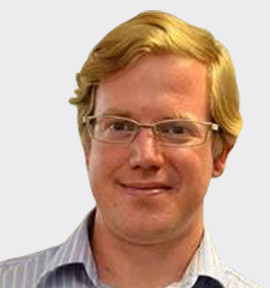Justin Dauwels
As associate professor within the Circuits and Systems group at the faculty of Electrical Engineering, Mathematics and Computer Science, rising star Justin Dauwels is fascinated by how data-driven intelligent systems can tackle many of society’s problems. Neural networks and graphical models are his hammer, and he applies it to topics ranging from autonomous cars to digital health and beyond. But neuroscience has always been a main theme ever since his Erasmus exchange to the Institute of Neuroinformatics in Zürich. ‘I apply the models that I studied as an engineer to help unravel and understand human behaviour,’ he says.
Healthcare for the underprivileged
In one of his long-standing projects, he developed machine learning tools to reliably diagnose epilepsy and other related brain conditions from EEGs – recordings of electrical activity on the scalp – allowing neurologists to spend more time with their patients. He has also used audio and video recordings between psychiatrists and their patients to help diagnose various mental health indications such as depression and schizophrenia as well as the severity of a patient’s symptoms. His drive in developing these tools is to bring world-class healthcare to the underprivileged, such as at Sion’s public hospital in Mumbai which he frequently visited. ‘It serves the local community, with doctors who are severely underequipped and completely overburdened,’ he says. ‘The various intellectual properties have been licensed to a startup focused on brain health to make sure these developments reach the patients.’
We want to be able to answer what-if questions prior to the operation; if I remove some tissue here, what will that accomplish?
Planning epilepsy operations
A more recent project, and one that he will continue to pursue at TU Delft, is to establish a paradigm shift in the planning of operations for epilepsy patients for whom medication alone leads to an insufficient reduction in symptoms. ‘Currently, the decision on where to operate is primarily based on abnormalities observed on a CT-scan,’ he says. ‘We want to be able to answer what-if questions prior to the operation; if I remove some tissue here, what will that accomplish?’ Using advanced imaging, electrical measurements, and anatomical knowledge, Dauwels and collaborators buildt a very simple mathematical model of the patient’s brain. They can subsequently perform virtual resections and run the model to see if it reduces epilepsy attacks. Using only a basic model, this technique was more than 80% correct in a small cohort of patients for whom the outcome of the actually performed surgery was known. ‘We will now improve our model and analyse more patients.’
Next generation deep learning
TU Delft was already on Dauwels’ radar at the time of his master’s thesis, but he chose to first sharpen his skills in Japan, the USA and Singapore. But now, TU Delft is the perfect setting for him. Partially because it is much closer to his parents, who still live in Belgium, and especially because Medical Delta and the ongoing convergence with Erasmus University and ErasmusMC allow him to cooperate with many top-level clinicians. ‘Pretty much everyone in our group has ties with ErasmucMC, meaning there are many opportunities to apply my hammer,’ he says.
But it is not all about applications. He will also delve into the fundamentals of deep learning. ‘People start to realise that neural networks, on their own, won’t be able to address all problems. I have been working on graphical models for more than twenty years and these are a promising path towards next generation deep learning systems. It’s about building a better hammer, one that combines the fast, instinctive thinking of neural networks with the slow thinking of graphical and logical models. Just like in humans, it makes sense to verify an intuitive answer and to correct it if necessary.’
